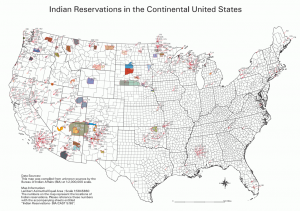Indian Reservation Process Service Press Release
The process server attempting to serve a state subpoena on a reservation in most cases possesses no authority to effectuate service.
LOS ANGELES, CA, UNITED STATES, April 28, 2017 /EINPresswire.com/ -- Service of process on Indian reservations has long been a thorn in the side of United States process servers. Many service firms avoid Indian reservations altogether, while others approach the issue with trepidation, half-fearing that they are going to be chased off the reservation at bow-and-arrow point.
My years of experience at John A. DeMarr P.I. have taught me that service of process on tribal lands needn’t be so intimidating. The matter can be approached rationally and result in successful service if one appreciates one simple fact: that Indian tribes enjoy sovereignty over their reservations.
The Constitution itself establishes that the Indian tribes are unique entities that differ from the federal government, the states and foreign countries. The history of Indian sovereignty over the intervening 220 years has been checkered to say the least, but the past thirty years have seen a redress of the balance in favor of Indian reservations’ autonomy. That autonomy includes the existence of tribal police and tribal courts, whose jurisdiction generally precludes the authority of state governments.
This is the origin of the difficulties inherent in service of process on Indian reservations. The process server attempting to serve a state subpoena on a reservation in most cases possesses no authority to effectuate service. The case is akin to an American process server wanting to serve an American subpoena in France, an action that impinges upon French sovereignty. The service in such a case must be performed by a French process server and according to French law.
Different reservations have different systems for service of process. Fortunately, there are now online resources that provide information as to how some of the larger tribes operate (the State of Arizona has a very helpful website). Additionally, the Native American Consultation Database offers a means of locating the clerks of the various tribal courts.
The scenario for service of process on Indian lands that turns up most frequently is one in which the service documents are forwarded to the tribal court (generally with a fee.) The court then, in effect, “domesticates” the documents to be served, and they are entrusted to the reservation’s own process server for delivery.
The second scenario (found with, for example, the Tonto Apache in Arizona or the Pauma in Southern California) allows for non-resident servers of process to effect service on residents of the reservation, although not in the way service is usually conducted. The tribal authorities and/or court must still be consulted, but there is no on-reservation process server. The non-resident process server is allowed onto the reservation, but with an Indian escort, who guides the process server to the subject, and then off the reservation. For the process server, this scenario has the advantage of providing first-hand knowledge that the service was properly effectuated.
A third option, which sometimes becomes necessary, is serving the reservation resident when he is not on tribal lands. This usually requires a surveillance operation, but, at times, that may be simpler than having resort to the tribal courts. The process server needs to assess the off-reservation service question, as it can be either more practical, or less practical, than on-reservation service. (The subject, obviously, must be someone who routinely goes off the reservation, so this option is not always viable.)
Beyond these three options, there is the possibility of certified mail as a means of conveying the documents to the subject. That, however, comes with all the flaws attached to any service by mail. Additionally, most Indian reservations do not have regular postal service, meaning that the server depends upon the restricted delivery option. If iron-clad service is the goal, the mail option should probably remain a last resort.
There is, actually, an even more final last resort, although it is not always practicable. While officials of the state have highly limited authority on Indian reservations, tribal lands do fall under the jurisdiction of the federal government. A federal marshal, therefore, can exercise his authority on an Indian reservation, and the possibility of enlisting a marshal’s assistance in effecting service on an elusive resident of a reservation does exist.
While service of process on tribal lands has its complexities, it is hardly baffling, and John A. DeMarr P.I. has had considerable success in effectuating service under these circumstances. What is needed is a knowledge of tribal laws and a respectful approach to the tribal courts, which we have found to be uniformly helpful when consulted. Perhaps respect is the key factor: the process server needs to appreciate Indian sovereignty on tribal lands, and that he is no longer operating in the state in which he is registered.
With that attitude in mind, most of the supposed difficulties disappear.
If I can be of any assistance with a case involving service on an Indian reservation, I may be contacted at any of the following:
John A. DeMarr PI
(877) 4-DEMARR | (877) 433-6277
(714) 546-7373
(714) 546-7474 (fax)
www.demarr.com
John DeMarr
John A DeMarr, P.I.
(877) 433-6277
email us here
Legal Disclaimer:
EIN Presswire provides this news content "as is" without warranty of any kind. We do not accept any responsibility or liability for the accuracy, content, images, videos, licenses, completeness, legality, or reliability of the information contained in this article. If you have any complaints or copyright issues related to this article, kindly contact the author above.


